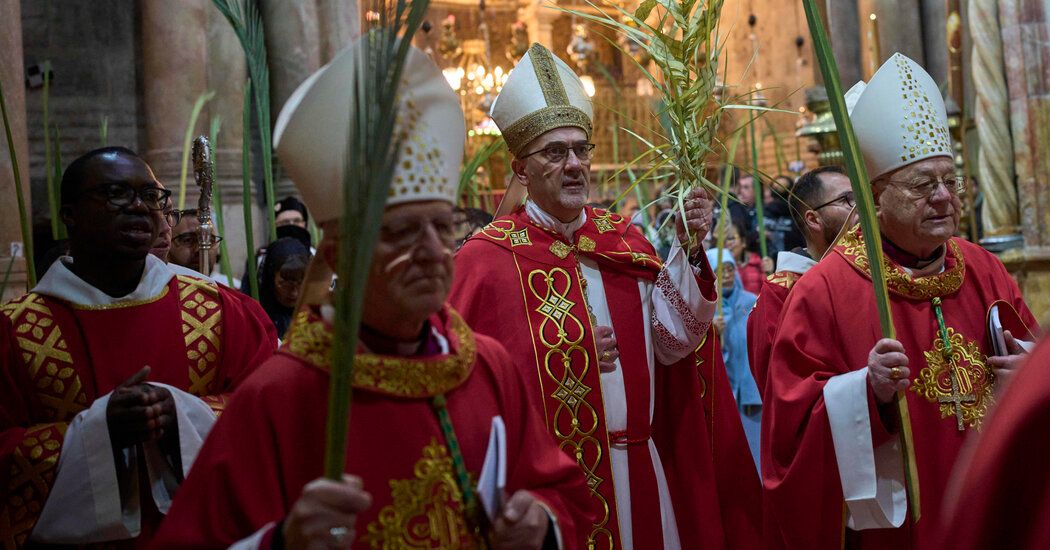In the days after Hamas attacked Israel on Oct. 7, 2023, Cardinal Pierbattista Pizzaballa, the Latin patriarch of Jerusalem, offered himself up as a hostage in exchange for the freedom of kidnapped Israeli children.
The offer, reported by Vatican News, the Holy See’s news portal, was not taken up, but it nevertheless drew attention to Cardinal Pizzaballa, who is a contender to succeed Pope Francis.
As an Italian, Cardinal Pizzaballa would bring the papacy back under control of a country that dominated it for centuries, after a gap of almost 50 years. His long experience in a politically fraught region that is the cradle of three major religions — he was ordained in 1990, at the age of 25, and moved to Jerusalem that year — has also boosted his papal capital.
But Cardinal Pizzaballa is seen as a Vatican outsider, given that he has spent decades in the Middle East, rather than building alliances closer to home.
Some cardinals and other members of the Roman Catholic Church’s hierarchy are also concerned that Cardinal Pizzaballa, 60, may be too young for the job. Pope John Paul II was elected at 58 and served for 26 years. The prospect of another papacy lasting a quarter-century or more has given pause to some of the cardinals who will elect the next pope.
Cardinal Pizzaballa’s reverence for traditional elements of church practice has made him palatable to some conservatives. But after spending decades in the Middle East, he is something of a wild card, since his positions on many issues that have caused division in the church are not known.
What he does have, Vatican experts agree, is a personal touch as a church leader that Pope Francis valued.
“He embodies a pastoral approach,” said Massimo Faggioli, a professor of theology at Villanova University. “In Jerusalem, you deal with other religions that have strong opinions on these issues, so you have to not become a crusader in any possible sense of the word.”
Cardinal Pizzaballa “comes from a pragmatic Catholic culture,” Mr. Faggioli added. “He is not going to wage a culture war on sex- and gender-related issues.”
The cardinal declined to comment for this article.
Cardinal Pizzaballa is credited with deftly navigating the Middle East’s politics and communities, speaking forcefully against injustice and hatred but also making friends among Jews, Muslims, Christians and other communities. Above all, he developed a reputation as someone willing to listen.
People who have worked closely with him in Jerusalem described him as a capable administrator and a humble leader with little time for pomp.
“He cares for the poor,” said Wadie Abunassar, the coordinator of the Forum of Holy Land Christians, a nongovernmental group of Christian laity in Israel. “He helps in a discreet way. He’s a person who likes to build bridges with every human being.”
When Hamas attacked Israel in 2023, the cardinal had been in his new role for only a few days, but he had spent 35 years in the region. A Franciscan ordained in northern Italy, he became a student of biblical theology in Jerusalem and ended up teaching biblical Hebrew. Alongside his native Italian and Hebrew, he speaks English but only limited Arabic.
His ability with languages and deft diplomacy came into use as he cared for Israel’s Hebrew-speaking Catholics, paying almost monthly visits to parishes. He has also visited the tiny Christian community in Gaza during the war there and has an open dialogue with Jewish Israelis.
Hana Bendcowsky, project director of the Jewish-Christian program at the Rossing Center for Education and Dialogue, an interreligious organization based in Jerusalem, praised his work and said she hoped he becomes pope — but not for another decade. “We still need him here,” she said.
Xavier Abu Eid, a Palestinian political scientist and author based in Ramallah in the occupied West Bank, said that many Palestinians believe that the cardinal should have spoken out more forcefully against Israel’s actions in Gaza, but added that there were limits to how much could be expected of a church leader.
Francis did speak out as Palestinian casualties rose in Gaza, writing in a book released in November that the war should be investigated to determine whether it constituted a genocide. This drew a harsh rebuke from a member of the Israeli government.
In April, the cardinal traveled to Rome to talk to Francis to organize a meeting between him and rabbis concerned about the language he had used, according to Oded Wiener, a former director-general of the Chief Rabbinate of Israel who was responsible for interfaith relations and the rabbinate’s relations with the Vatican.
A date was set for the meeting, but it did not happen, first for technical reasons and then because of the decline in Francis’ health, Mr. Wiener said. It was not clear to what extent the cardinal personally sympathized with the concerns of the rabbis.
In Francis’ final address, delivered the day before he died, the pope said that the growing climate of antisemitism around the world was “worrying,” and he also denounced Gaza’s “deplorable humanitarian situation.”
Patrick Kingsley contributed reporting from Jerusalem, and Emma Bubola from Rome.











